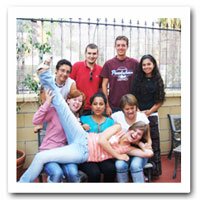 Málaga Travel Information
Málaga Travel Information
Málaga is the 6th largest city of Spain with over 500.000 inhabitants and close to 1.500.000 for the immediate region. The city is generally considered to be very safe but caution needs to be taken with regards to petty theft so always keep a very good eye on your belongings.
Money
 Spain is part of the Euro region and you can find a very good conversion tool for your currency into Euros here. You'll find a bank machine almost on every corner of the street which makes it very easy to withdraw cash whenever you need to. Credit cards are widely accepted but mostly restricted to Visa and MasterCard.
Spain is part of the Euro region and you can find a very good conversion tool for your currency into Euros here. You'll find a bank machine almost on every corner of the street which makes it very easy to withdraw cash whenever you need to. Credit cards are widely accepted but mostly restricted to Visa and MasterCard.
Getting around
Our school is located in the Eastern suburb of Pedregalejo around 15 minutes by bus from the city centre.
The city does not have metro but there's an excellent network of busses. Here you can find more information about public transportation in Málaga.
Climate
Málaga has more than 320 days of sunshine per year and one of the warmest climates in Europe with an average yearly temperature of 19ºC with warm summers and mild winters.
Airport
The airport of Málaga is called "Costa del Sol Airport" and is located approximately 8 km from the city centre. You can take the bus or taxi from the airport to the centre. A taxi will cost around € 20.
» Offical website of Málaga airport
Electricity
Spain has a 220V network and you may need an adaptor if you come from the UK or a non European country.
Daily expenses
Málaga is not an expensive city compared to other destinations in Western Europe but the gap between Spain and other countries has narrowed over the years. The following overview provides a guideline for typical expenses excluding your accommodation cost:
Breakfast: croissant + coffee: € 2.50
Lunch: sandwich (bocadillo) + drink: € 4.50 or
Lunch: menú del día: € 10.00
Dinner: grocery shopping: € 6 or
Dinner: "cheap & cheerful" restaurant: €17,50
Transportation cost per day: € 1.50 (based on purchasing a multi trip pass)
Glass of wine / beer: € 1.50
Once you include other costs such as telephone card, entrance tickets to museums / cinema etc. a minimum daily allowance of € 25 is the minimum to survive on [excluding accommodation].
Working and Visa
No visa is required for anyone holding a EU passport. If you are from the United States, Canada, Australia, Israel, New Zealand, Norway, Switzerland or Iceland you can stay up to 90 days without a visa.
If you want to stay longer or you are a citizen from another country, check with your local Spanish consulate or embassy. You can find a list at the Spanish Ministry of Foreign affairs at www.mae.es.
Holders of an EU passport can work in Spain without a work permit. All that is required is to apply for a registration number (N.I.E.) and a social security number which is an administrative formality. Non EU passport holders cannot work without a work permit.






Go to 3rd slide